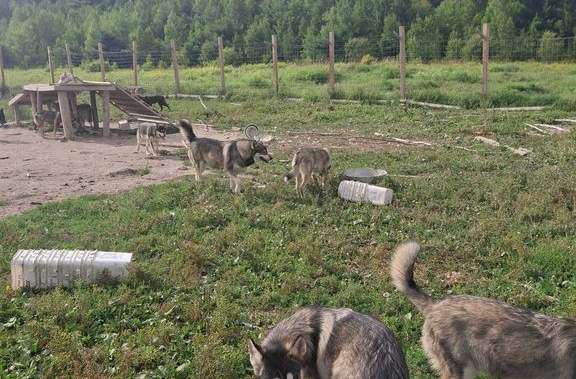Ontario man who raised a pack of wolf-dogs worries government will euthanize them

When a friend asked for help to build a fenced home for his dogs, Bryton Bongard made a deal: he would lend a hand in exchange for several puppies.
That is how he ended up with what is now a pack of 16 strong, black and grey wolf-dog hybrids he calls his “babies.”
The wolf-dogs that live in his backyard enclosure have never harmed anyone, Bongard said, nor have any neighbours complained since he brought the animals to his rural property in Wahnapitae, Ont., about 50 kilometres north of Sudbury, four years ago.
But the provincial government is set to seize them anyway, he said, because it is against the law to keep wildlife native to Ontario as pets or in captivity, with some exceptions for places like zoos and rehabilitation facilities.
“I’ve spent their entire lives with them … they’re just my babies, and they are basically my family at this point,” Bongard said in a recent interview.
“And it would be devastating for me to look out my window one day and not have them there.”
Bongard is prepared to surrender the pack to the Ministry of Natural Resources, but he desperately wants an answer to a question he says the province has so far refused to address: What fate awaits the wolf-dogs after they are taken from him next month?
While the government hasn’t explicitly said the wolf-dogs will be euthanized, it has told Bongard that if a sanctuary for the animals can’t be found, one last solution is that “the dogs have to be disposed of,” he said.
The ministry said it cannot provide specific details because the case is still active.
“In general, it’s against the law to keep wild animals from Ontario as pets or to hold them in captivity,” it said in a statement, noting some exceptions under the Fish and Wildlife Conservation Act.
“The government is committed to ensuring wildlife in captivity are treated with care and respect,” it said.
Bongard said the enclosure he built cost him around $35,000. The fence around nearly 8,000 square metres of land is roughly eight feet tall, with dig-proof aprons buried three feet underground to make sure the wolf-dogs don’t escape. The animals also have a cabin equipped with air-conditioning and a heater.
A butcher by trade, Bongard said he brings lots of meat scraps from work. The cost of feeding the pack varies between $60 and $200 weekly, depending on the season.

Get daily National news
Get the day’s top news, political, economic, and current affairs headlines, delivered to your inbox once a day.
His pets are smarter, bigger and very shy compared to dogs, Bongard said.
“They do bark and they do howl. But it sounds more like a choppy husky howl than it does an actual wolf.”
He said wolf-dogs can sometimes get destructive when they get bored, so he and his wife are playing and engaging with them every day.
Bongard said his wife – who is “mom” to the wolf-dogs – is even more heartbroken about the situation.
More than 600 people have signed an online petition calling on the government to leave the wolf-dogs under the family’s care.
“These animals have done nothing wrong — they are loved, well cared for and live with competent owners who provide them with excellent treatment, proper shelter and affection,” it reads.
The petition drew controversy after it was posted on the Wahnapitae community Facebook page. While some residents voiced support for Bongard, others raised safety concerns.
Bongard has downplayed those concerns, saying his dogs have never breached the fence. Even if they did escape, he said, they would steer clear of humans because they’re afraid of strangers.
“You have a better chance of getting struck by lightning or a vending machine falling on you than you do one of my dogs attacking you,” he said.
Bongard said he’s made several suggestions to the government in an effort to save the pack, including donating his current enclosure to a conservation group or buying more land to turn it into a conservation area.
However, he said the ministry has refused to engage in meaningful conversation.
Bongard’s troubles stared about a year ago, after firefighters showed up at his property when he had a bonfire.
“They asked me about why I had wolves in my backyard,” he said.
Local bylaw officers and ministry officials then got involved, visiting the site several times, including to do DNA tests on the animals, he said.
The government also seized nine wolf-dogs from Bongard’s friend who had given him the puppies in 2021. All were placed at a sanctuary in Alberta, but Bongard fears his own dogs won’t be able to find a home.
There are few sanctuaries for such animals in Canada and far fewer in Ontario – and they are often at capacity.
Kerry Bowman, an assistant professor at the University of Toronto’s school of environment, said while the exact number of wolf-dog hybrids is unknown, it could be extremely high in North America and some parts of Europe.
“Ethically, I would argue that breeding them is very, very problematic,” he said, adding that the “romanticization” of wolves in television and media has played a significant role in creating the problem.
“There’s a demand for them. They’re considered quite novel.”
Wolf-dogs are very different from dogs and keeping them as pets is not good for the animals and is unsafe for humans, Bowman said.
“There’s always a risk with wolf-dogs, even if they can be very gentle and very loving, that the behaviour could change,” he said, adding that such canines have harmed humans and pets in some cases.
Releasing them into the wild isn’t ideal because they lack wolves’ full hunting and survival skills, Bowman said. The wolf-dogs can also “weaken” the gene pool of natural wolves through interbreeding.
Still, Bowman said the case of Bongard’s pets “needs to be handled far more carefully than it has been so far,” as Canada is among the countries that are often too quick to turn to animal euthanasia.
There are many more sanctuaries for wolf-dogs in the United States and Bowman said while he doesn’t know the rules around transferring animals across the border, the owner and the government should look into it.
Bongard said he knows he broke the law and he accepts the consequences, but he is speaking out to save his animals – and to educate others about adopting “cute” wolf-dog puppies.
“When they reach maturity, which is around two years old, their personality flips,” he warned.
“Whereas one day it’s cute and fluffy, and the next day it’s eating your couch.”


Spirits maker Diageo will cease operations at its bottling facility in Amherstburg, Ont., early next year, as it shifts some bottling volume to the U.S., the company announced on Thursday.
The facility, which bottles Crown Royal products, will close in February in a move aimed at improving its North American supply chain.

Get breaking National news
For news impacting Canada and around the world, sign up for breaking news alerts delivered directly to you when they happen.
About 200 jobs will be affected.
“This was a difficult decision, but one that is crucial to improving the efficiency and resiliency of our supply chain network,” Marsha McIntosh, Diageo’s president of North America supply, said in a statement.
Diageo said it will engage with the community and find ways to support its employees through the transition, and work alongside Unifor to assist unionized workers.
The company said it will still maintain a “significant” footprint in Canada — including its headquarters and warehouse operations in the Greater Toronto Area, and bottling and distillation facilities in Manitoba and Quebec.
McIntosh added the company’s Crown Royal products will continue to be mashed, distilled and aged at its Canadian facilities.
© 2025 The Canadian Press

Toronto police say a 33-year-old man has been charged with attempted murder after allegedly striking two men with his car Wednesday evening.
Officers say they responded to reports of a collision in the area of Don Mills Road and Gateway Boulevard in the city’s North York neighbourhood just before 10:30 p.m.

Get daily National news
Get the day’s top news, political, economic, and current affairs headlines, delivered to your inbox once a day.
Police say two men got into an argument, leading to one man getting into his car and hitting the other man with it.
They say the man then put his car into reverse, striking a second man.
A man in his 50s was transported to hospital with serious injuries and the second man, in his 20s, had minor injuries.
Police say the suspect from Markham, Ont., faces several other charges as well, including two counts of assault with a weapon, uttering threats and dangerous driving.
© 2025 The Canadian Press

A court document shows a Lindsay, Ont., man facing charges for allegedly breaking into an apartment was carrying a crossbow when he was confronted by a tenant.
The resident, Jeremy David McDonald, is also facing assault charges in the incident on Aug. 18 — a fact that has generated widespread interest in the case.
Police information filed in court alleges that Michael Kyle Breen damaged a window and screen at McDonald’s home and carried a crossbow.
The court document says the 41-year-old Breen is charged with break and enter, possession of a weapon for a dangerous purpose, mischief under $5,000 and failing to comply with a probation order.

Get daily National news
Get the day’s top news, political, economic, and current affairs headlines, delivered to your inbox once a day.
Police have said that Breen, who is scheduled to appear in court for a bail hearing next week, was already wanted for unrelated offences.
McDonald, the 44-year-old resident, was charged with aggravated assault and assault with a weapon after he allegedly “did endanger the life” of Breen.
Premier Doug Ford blasted the decision to charge the apartment resident, saying last week that it shows “something is broken.”
Kawartha Lakes Police Chief Kirk Robertson wrote in a statement Wednesday that he recognizes the incident has generated significant public interest and “emotional” responses, but called some of the reaction “unjust and inaccurate.”
Robertson wrote that individuals have the right to defend themselves and their property, but the law requires that any defensive action be proportionate to the threat faced.
“This means that while homeowners do have the right to protect themselves and their property, the use of force must be reasonable given the circumstances,” he wrote.
© 2025 The Canadian Press
-

 Uncategorized3 months ago
Uncategorized3 months agoShop Proud, Eat Proud, Be Proud — Ottawa Canada Day Market This June 28th
-

 3 months ago
3 months agoCanada’s world junior trial saw juries tossed, intense testimony. Here’s a recap
-

 2 months ago
2 months agoRing of Fire road to bring prosperity to First Nation, problems for caribou: report
-

 2 months ago
2 months agoMeasles circulating in northeastern B.C. community, health officials warn
-

 3 months ago
3 months agoAnishinabek Nation chief says he briefed Ontario police on protests against Bill 5
-

 2 months ago
2 months agoFormer major leaguer, Jays doctor Ron Taylor dies
-

 2 months ago
2 months agoJagmeet Singh apologizes for attending Kendrick Lamar concert after Drake calls him out
-

 2 months ago
2 months agoDreaming of a lakeside cottage but can’t afford it? Co-ownership could open that door





